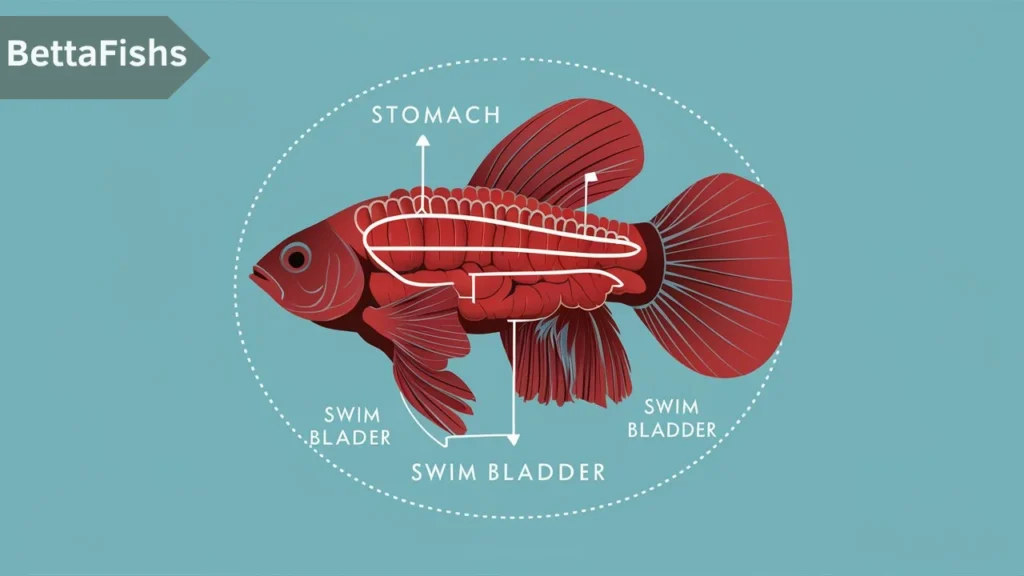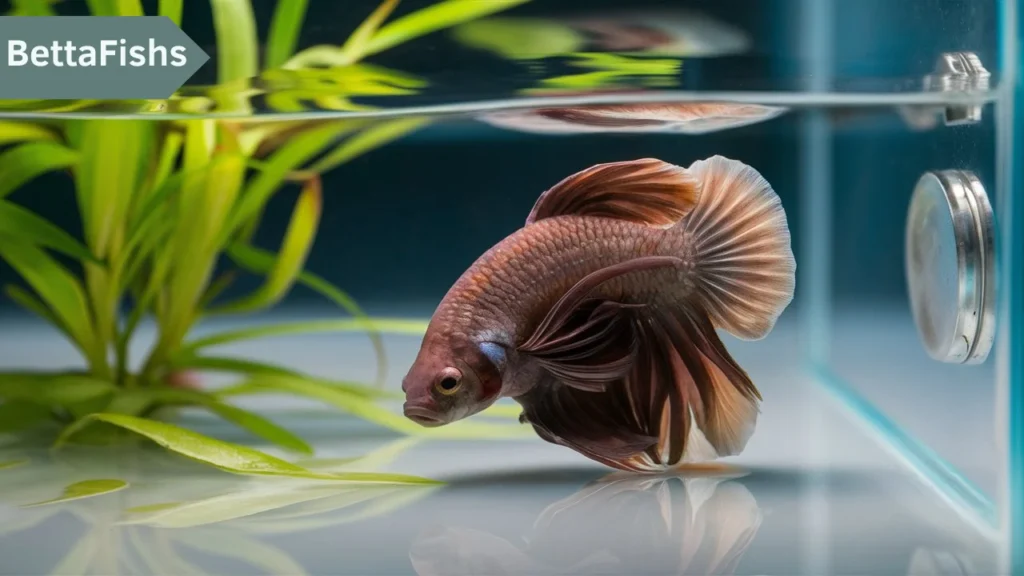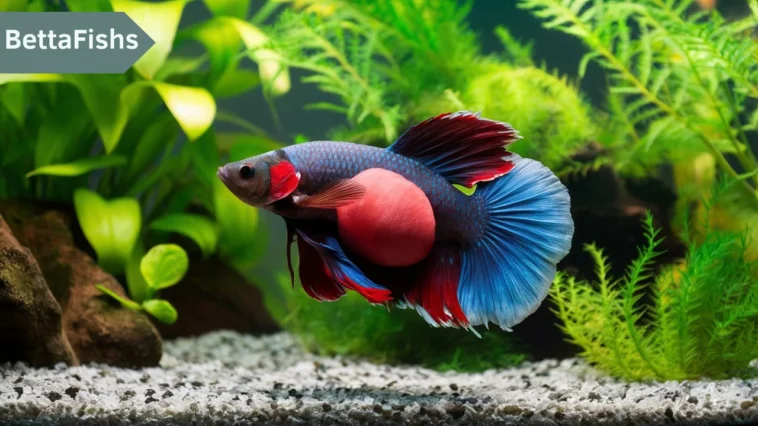Betta fish, with their vibrant colors and flowing fins, are popular pets for both novice and experienced fish keepers. However, like all pets, Betta fish can encounter health issues, one of the most common “Betta fish swollen tummy”. If you’ve noticed that your Betta fish’s belly is unusually large, it’s essential to understand the potential causes and appropriate treatments to ensure your fish remains healthy and happy.
Betta Fish Anatomy
To grasp why your Betta fish is low. Maintaining clean water and isolating the affected fish is crucial.
- For Internal Parasites: Using a specialized antiparasitic treatment, combined with thorough tank cleaning, can eliminate the parasites.
- For Tumors and Cysts: Unfortunately, there are limited treatment options for tumors and cysts in Betta fish. Consultation with a veterinarian is recommended, but in many cases, palliative care might be the only option.
Preventing Swollen Tummy in Betta Fish
Prevention is always better than cure, especially when it comes to the delicate health of Betta fish. Here are some essential steps to prevent a swollen tummy:
Best Feeding Practices
Feed your Betta fish small amounts of food once or twice a day, ensuring they can consume it within two minutes. Overfeeding is a significant risk factor for digestive issues, so it’s essential to be mindful of portion sizes. Consider fasting your Betta one day per week to promote healthy digestion.
Regular Tank Maintenance
Maintaining a clean tank is vital for preventing a range of health problems. Regularly change the water, remove uneaten food, and clean the substrate to avoid the buildup of harmful bacteria and toxins that can stress your fish and lead to illness.
Monitoring Fish Behavior and Health
Keep a close eye on your Betta’s behavior and appearance. Any changes, such as a swollen tummy, unusual swimming patterns, or lethargy, should be investigated immediately. The likelihood that a health issue can be successfully treated can be greatly increased by early detection.

Diet’s Impact on Betta Fish Health
Diet plays a crucial role in maintaining the overall health of Betta fish. A well-balanced diet not only keeps your Betta vibrant and active but also helps prevent many health issues, including a swollen tummy.
Importance of a Balanced Diet
Betta fish require a diet rich in protein, as they are carnivorous by nature. High-quality Betta pellets or flakes, supplemented with occasional live or frozen foods like bloodworms or brine shrimp, provide the necessary nutrients. Avoid feeding them human food or foods not specifically designed for Betta fish, as these can cause digestive issues.
Recommended Foods for Betta Fish
- Betta Pellets/Flakes: These should be the staple of your Betta’s diet, providing a balanced mix of proteins, fats, and vitamins.
- Live/Frozen Foods: Bloodworms, brine shrimp, and daphnia are excellent sources of protein and should be given as treats a few times a week.
- Freeze-Dried Foods: These can be fed occasionally but should be soaked in water before feeding to prevent bloating.
Foods to Avoid
Avoid overfeeding high-fat foods or those designed for other fish species. Also, steer clear of foods that expand significantly in water, as they can cause bloating and digestive issues in Betta fish.
When to Seek Professional Help
While many cases of a swollen tummy can be managed with home care, there are situations where professional veterinary assistance is necessary.
Signs That Require a Vet’s Attention
- Persistent Swelling: If the swelling does not improve with dietary changes or fasting, it may indicate a more serious issue like a tumor or internal infection.
- Severe Symptoms: If your Betta is showing signs of extreme lethargy, severe buoyancy issues, or protruding scales, it’s crucial to consult a vet immediately.
- Unidentified Causes: If you’re unable to determine the cause of the swollen tummy, or if the fish is not responding to treatment, a vet’s diagnosis is essential.
How to Find a Qualified Aquatic Veterinarian
Finding a veterinarian who specializes in fish can be challenging, but there are resources available. Start by asking local pet stores or fish clubs for recommendations. Additionally, online directories of aquatic veterinarians can help you find a specialist in your area.
Conclusion
A swollen tummy in Betta fish is a common but concerning issue that can arise from various causes, ranging from simple overfeeding to more serious conditions like Dropsy or tumors. Understanding the symptoms and knowing how to diagnose and treat the issue is crucial for maintaining the health of your Betta. By following best practices in feeding, tank maintenance, and monitoring your fish’s behavior, you can prevent many of the problems that lead to a swollen tummy. However, when in doubt, seeking professional help is always the best course of action.

FAQs
1. What should I do if my Betta fish has a swollen tummy?
If your Betta fish has a swollen tummy, start by assessing their diet and feeding habits. Consider fasting the fish for a day or two and then feeding it a small amount of cooked, shelled pea to aid digestion. If the swelling persists, it may be necessary to treat for possible infections or consult a veterinarian.
2. Can a swollen tummy in Betta fish be fatal?
Yes, a swollen tummy can be fatal if caused by severe conditions like Dropsy, internal infections, or tumors. Early detection and treatment are key to improving the chances of recovery.
3. How often should I feed my Betta fish to prevent a swollen tummy?
Feed your Betta fish once or twice a day, with only as much food as they can consume in two minutes. Avoid overfeeding, and consider fasting your Betta one day per week to promote healthy digestion.
4. What are the signs that my Betta fish might have a serious health issue?
Signs of serious health issues include persistent swelling, lethargy, unusual swimming patterns, loss of appetite, and protruding scales. If you notice any of these symptoms, consult a veterinarian promptly.
5. Is it possible to prevent swim bladder disorder in Betta fish?
Yes, swim bladder disorder can often be prevented by maintaining a proper diet, avoiding overfeeding, and ensuring clean water conditions. Regular observation of your Betta’s behavior and health can also help catch any early signs of the disorder.





One Comment
Leave a ReplyOne Ping
Pingback:Betta fish diseases and treatments